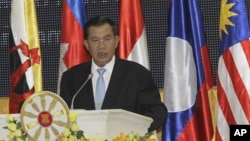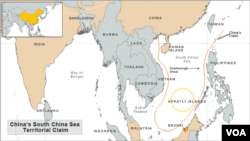PHNOM PENH — Senior Southeast Asian officials are pursuing a long-term solution to competing claims for the South China Sea this week. Analysts say the effort marks a key step if countries in the 10-member Association of Southeast Asian Nations want to resolve the territorial impasse in the near future. However, many roadblocks remain.
When Cambodia hosted the ASEAN leaders' summit in April, it was accused of attempting to quash discussions on the South China Sea.
It may be a sign of the urgency that ASEAN officials now feel on the issue that Cambodian Prime Minister Hun Sen opened this week's ASEAN foreign ministers' meeting Monday by stressing the need for a a consensus on how to resolve the territorial dispute.
"We should put emphasis on the implementation of the declaration of conduct, including the eventual conclusion of the code of conduct in the South China Sea," said the prime minister.
ASEAN members Vietnam, the Philippines, Brunei and Malaysia all claim territory in the South China Sea. That puts them up against powerhouse China, which has claimed essentially all of the body of water.
China and Asean signed a Declaration on the Conduct of Parties in the South China Sea a decade ago - essentially agreeing they must resolve the situation peacefully. But it has taken this long to come to terms on how to proceed to the next stage - crafting a code of conduct which would guide the parties as the issue moves forward.
Carlyle Thayer, an specialist on ASEAN affairs with at the University of New South Wales, says this week is make or break time for ASEAN countries on the issue.
"So it's unknown at this particular time where ASEAN is going on this. It may well be in the compromise it includes items that are impossible to negotiate with China and it will be dropped or watered down in the long run so the make or break time is one," said Thayer.
Pavin Chachavalpongpun, a political scientist based at Kyoto University, says the week's high-level meetings provide a necessary platform for the countries to discuss the issue. But he is not optimistic there will be much progress.
"But I think ASEAN still remains only a platform for talking talking and talking, no action. I do not have a lot of hope, to be honest with you, on the upcoming ASEAN meetings, he said.
Although it has dominated media coverage leading up to this week's meetings, the South China Sea is only one of many issues on the agenda.
U.S. Secretary of State Hillary Clinton is scheduled to attend the sessions. Analysts expect Clinton to downplay the United States' recently announced military shift toward Asia, in the hope easing perceived tensions with China in its backyard.
"Her point here is to move away from that and re-deflect attention to the much broader interests she'll argue the U.S. has in the region,and that the U.S. is not out to contain, but to cooperate with China," said Carlyle Thayer.
This week's meetings are schedule to conclude Friday.
When Cambodia hosted the ASEAN leaders' summit in April, it was accused of attempting to quash discussions on the South China Sea.
It may be a sign of the urgency that ASEAN officials now feel on the issue that Cambodian Prime Minister Hun Sen opened this week's ASEAN foreign ministers' meeting Monday by stressing the need for a a consensus on how to resolve the territorial dispute.
"We should put emphasis on the implementation of the declaration of conduct, including the eventual conclusion of the code of conduct in the South China Sea," said the prime minister.
ASEAN members Vietnam, the Philippines, Brunei and Malaysia all claim territory in the South China Sea. That puts them up against powerhouse China, which has claimed essentially all of the body of water.
China and Asean signed a Declaration on the Conduct of Parties in the South China Sea a decade ago - essentially agreeing they must resolve the situation peacefully. But it has taken this long to come to terms on how to proceed to the next stage - crafting a code of conduct which would guide the parties as the issue moves forward.
Carlyle Thayer, an specialist on ASEAN affairs with at the University of New South Wales, says this week is make or break time for ASEAN countries on the issue.
"So it's unknown at this particular time where ASEAN is going on this. It may well be in the compromise it includes items that are impossible to negotiate with China and it will be dropped or watered down in the long run so the make or break time is one," said Thayer.
Pavin Chachavalpongpun, a political scientist based at Kyoto University, says the week's high-level meetings provide a necessary platform for the countries to discuss the issue. But he is not optimistic there will be much progress.
"But I think ASEAN still remains only a platform for talking talking and talking, no action. I do not have a lot of hope, to be honest with you, on the upcoming ASEAN meetings, he said.
Although it has dominated media coverage leading up to this week's meetings, the South China Sea is only one of many issues on the agenda.
U.S. Secretary of State Hillary Clinton is scheduled to attend the sessions. Analysts expect Clinton to downplay the United States' recently announced military shift toward Asia, in the hope easing perceived tensions with China in its backyard.
"Her point here is to move away from that and re-deflect attention to the much broader interests she'll argue the U.S. has in the region,and that the U.S. is not out to contain, but to cooperate with China," said Carlyle Thayer.
This week's meetings are schedule to conclude Friday.





